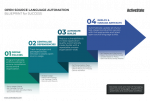The U.S. economy may be struggling to regain its footing, but the world of technology is growing, according to statistics released by the TechAmerica Foundation, a non-profit affiliate of TechAmerica, a technology industry advocacy organization. Meanwhile, venture capital firms invested US$2 billion into U.S. software services companies in the third quarter of 2011, according to a PricewaterhouseCoopers/Moneytree survey.
The software service sector—defined by the TechAmerica Foundation as organizations that produce packaged software, development and applications—added 22,800 jobs in 2010. The engineering and tech service sector, in which the TechAmerica Foundation includes research and development firms as well as mechanical engineering companies, lost 12,900 jobs in 2010.
The TechAmerica Foundation has released a Cyberstates report each year for the past 14 years, and it consists of five chapters detailing trends in national and state economies for high-tech employment.
The average salary for anyone working at these companies also saw a slight increase in 2010. In 2009, those in the engineering and tech services field made $84,500 on average, and in 2010, they made $84,800. Software service professionals’ salaries grew at a faster rate, from an average of $93,100 in 2009 to $95,200 in 2010.
California, according to the report, had the highest average high-tech industry wage in 2010 with an average of $110,600, followed by Massachusetts ($107,600), Washington state ($105,500) and New Jersey ($97,300).
The U.S. provides many of the things startups need to succeed, according to TechAmerica and Rhianna Collier, vice president of the software division of the Software and Industry Information Association.
“Venture capital [firms] are really open to new ideas, and the workforce is very talented,” Collier said. “The talent coming out of the universities is much more tech-savvy, and they understand the needs of a startup.”
Collier added that the dedication and excitement among these new entrepreneurs helped to keep the investors secure about investing, despite the economy. The workforce, she said, shows a great potential for innovation, which is important.
“The federal government does a good job of basic research that tech companies then turn into new technologies,” like the Internet itself (which was a Department of Defense project), said Matthew Kazmierczak, senior vice president at TechAmerica.
Steve Harris, vice president of marketing at CloudBees, said these entrepreneurs should be aware of some best practices before jumping into a startup.
He advised using the cloud for development environments, and as a way to communicate with a distributed team. Teams looking to save money can use the cloud with tools that offer a pay-as-you-go model, so that you’re only “paying for what you use,” he said.
Harris recommended continuous integration and agile as the best development methodologies for startups, as these methods allow teams to change and update their applications, services and products quickly.
Make sure you have access to the capital you need to get started, Harris said. Some places to consider include Silicon Valley, Boston and New York because of their history. Additionally, think about being lean in your operations, Harris said, so that you can maximize the money invested.
Finally, Harris said teams are bolstered in the U.S. by their ability to leverage the mentality of taking a risk in order to gain a big payoff in the end to recruit developers both in the U.S. and overseas.





